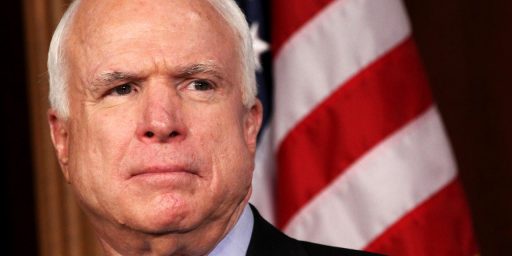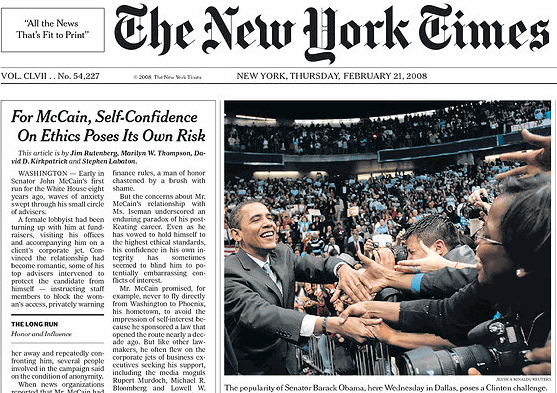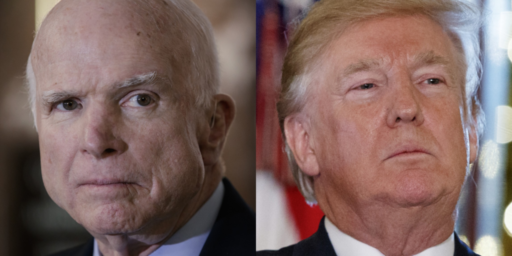The Candidates’ China Policies
It’s gone largely unnoticed here in the States but both Sen. John McCain and Sen. Barack Obama have produced position papers on the U. S. policy with respect to China. The papers are materially the same and without much in the way of concrete proposals, lauding China’s growth in wealth and influence in recent years and calling for China’s participation as a responsible member of the world community.
Here’s the conclusion of Sen. McCain’s statement:
China and the United States are not destined to be adversaries. We have numerous overlapping interests and I hope to see our relationship evolve in a manner that benefits both countries and, in turn, the Asia-Pacific region and the world. Our ties must be rooted in a broader regional and international order that provides the indispensible bedrock for the shared prosperity and stability we all desire. America itself must be a stakeholder in that system, and we must take seriously our responsibilities to contribute to it. It is in this spirit that America’s relations with China, and with the countries that comprise the region surrounding it, should proceed.
and the conclusion of Sen. Obama’s:
Since the 1970s, America’s policy of engaging China has produced major benefits for both sides and for Asia overall. The US-China relationship has had its share of challenges, and new ones will inevitably emerge. Especially in a world of common security, where events in any corner of the globe can affect the entire planet, the world more than ever requires that every major country not only pursue its narrow interests but also accept its responsibility to pursue urgently needed solutions to these broader problems. My administration will seek to revitalize America and lead it to realize its full potential for constructive engagement in Asia and in the global arena.
There are some interesting differences of emphasis. Sen. Obama’s paper emphasizes environmental considerations, mentioning them in four places; Sen. McCain’s does not. Sen. McCain’s takes globalization as a given to which the U. S. must respond:
We also must recognize, however, that while open trade with Asia is in America’s interest, globalization will not automatically benefit every American. That’s why we must remain committed to education, retraining and help for displaced workers, regardless of whether their job went away because of trade, technological innovation, or shifts in consumer spending patterns. For Americans who have lost a job, we need to expand opportunities for further education and training that can open new doors. We need to modernize our unemployment insurance system to reflect the reality of the 21st century economy: jobs that go away no longer come back when business rebounds. We need to help displaced workers make ends meet between jobs and move people quickly on to the next opportunity.
while to my mind Sen. Obama’s view seems somewhat more tentative:
As President, I will take a vigorous, pragmatic approach to addressing these issues [ed. currency policy, IP protection, restrictions on foreign investment], utilizing our domestic trade remedy laws as well as the WTO’s dispute settlement mechanism wherever appropriate. High-level dialogue among economic leaders in both countries is also important to achieving real progress. My approach to our economic relationship is positive and forward-looking: to remove obstructions to gaining the benefits of trade and thus to enable faster, and healthier, growth in both economies.
There are also some delicious ironies. Sen. Obama hails the Six Party Talks:
We know that America and China can accomplish much when we recognize our common interests. US and Chinese cooperation in the Six Party Talks on the North Korean nuclear issue over the past few years makes clear that we can work together constructively, bilaterally and with others, to reduce tensions on even extraordinarily sensitive issues.
You may recall that the last Democrat to run for the presidency scoffed at the Six Party Talks.
Sen. McCain’s paper does not mention terrorism once; Sen. Obama’s does:
In the modern world, non-traditional security threats are looming increasingly large. These include the challenges of terrorism, proliferation, failed states, infectious diseases, humanitarian disasters and piracy on the high seas.
At least to my eye John McCain’s paper strikes a slightly more internationalist tone:
China’s growing power and influence endow it with the obligation to behave as a responsible stakeholder in global politics. China could bolster its claim that it is “peacefully rising” by being more transparent about its significant military buildup and by working with the world to isolate pariah states. In addition, how a nation treats its citizens is a legitimate subject of international concern in today’s world. China has signed numerous international agreements that make its domestic behavior more than just a matter of national sovereignty. To be a responsible stakeholder in the modern international system, a government must also be responsible at home, in protecting the rights of its people.
However, in the final analysis the similarities between the positions of the two candidates are more important than the differences which suggests, at least to me, that regardless of who is elected in November U. S. policy with respect to China is unlikely to make any dramatic shifts.




